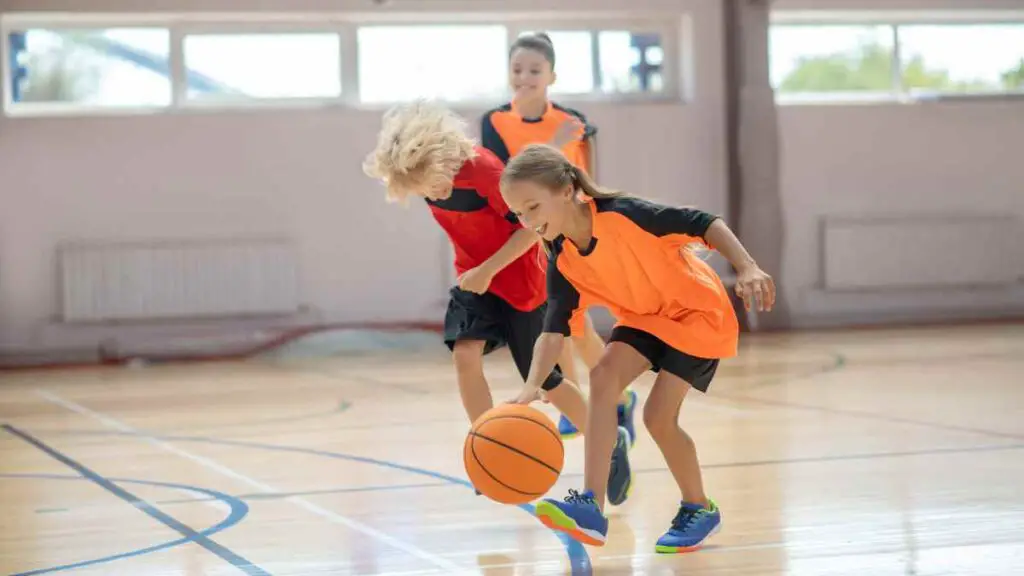So, you want to help your kids excel at sports?
Well, it’s time to develop a growth mindset! A growth mindset is the belief that you can improve your abilities and intelligence through hard work and dedication.
When it comes to sports, having a growth mindset can make all the difference in your child’s success.

Think about it: if your child believes that their abilities are fixed and cannot be improved, they may give up easily when faced with a challenge. But if they have a growth mindset, they will see challenges as opportunities to learn and grow. This can lead to increased motivation, resilience, and better performance on the field or court.
So, how can you help your child develop a growth mindset when it comes to sports? It starts with praising effort over natural ability. Instead of saying, “You’re so good at soccer,” try saying, “I’m proud of how hard you worked at soccer practice today.” This reinforces the idea that success comes from effort and hard work, not just natural talent. Additionally, encourage your child to set goals and focus on progress rather than just winning. With a growth mindset, your child can learn to embrace challenges, persist through obstacles, and ultimately achieve their full potential in sports.
The Comedy of Errors: Embracing Mistakes
Sports can be a great way for your kids to learn important life skills like teamwork, discipline, and perseverance. However, the pressure to perform can sometimes lead to a fear of failure that can hinder their progress. That’s why it’s important to teach your kids to embrace mistakes and learn from them. Here are some tips on how to do that.
The Art of Tripping: Learning from Failures
Mistakes are a natural part of learning, and sports are no exception. The key is to help your kids see mistakes as opportunities to learn and grow rather than as something to be ashamed of. One way to do this is to encourage them to reflect on their mistakes and think about what they can do differently next time.
Another way to help your kids learn from their mistakes is to model this behavior yourself. Talk to them about mistakes you’ve made in your own life and how you learned from them. This can help them see that everyone makes mistakes and that it’s okay to make mistakes as long as you learn from them.
-

Bold Male Pride – Baseball Trucker Cap Celebrating Masculinity
£18.00 Select options This product has multiple variants. The options may be chosen on the product page -

Dad Bod Appreciation Gift Mug
£14.00 Add to cart -

Dad Bod, Bad Jokes Structured Baseball Cap
£22.00 Select options This product has multiple variants. The options may be chosen on the product page
The Blooper Reel: Dealing with Setbacks
Setbacks are a natural part of any sport, and it’s important to teach your kids how to deal with them in a healthy way. One way to do this is to help them develop resilience, which is the ability to bounce back from setbacks.
Encourage your kids to keep a positive attitude even when things don’t go their way. Remind them that setbacks are temporary and that they can always try again. You can also help them develop a growth mindset by focusing on their effort rather than their performance. This can help them see that hard work and practice are the keys to success rather than innate talent.
In conclusion, mistakes and setbacks are a natural part of sports, and it’s important to teach your kids how to embrace them and learn from them. By helping them develop resilience and a growth mindset, you can set them up for success both on and off the field.
The Sport of Learning: Skills and Practice
Sports are a great way for kids to develop a growth mindset. But to excel at sports, they need to learn the right skills and practice regularly. In this section, we’ll explore how you can help your kids balance school and sports and the importance of practice.
The Juggling Act: Balancing School and Sports
As a parent, you know that school is important. But so is sports. So, how do you help your kids balance the two? Here are some tips:
- Set priorities: Help your kids prioritize their time. Encourage them to complete their schoolwork first, then focus on sports.
- Create a schedule: Create a schedule that includes time for schoolwork, sports, and other activities. Stick to the schedule as much as possible.
- Be flexible: Be flexible when unexpected events come up. If your child has a big test coming up, they may need to skip practice to study.
Remember, it’s all about balance. Encourage your kids to work hard in school and on the field.
The Homework Hustle: The Importance of Practice
Practice makes perfect, right? Well, not exactly. Practice makes progress. And progress is what we’re after. Here are some tips to help your kids get the most out of practice:
- Focus on skills: Encourage your kids to focus on developing specific skills during practice. Whether it’s shooting, passing, or dribbling, practice makes progress.
- Set goals: Help your kids set goals for themselves. Whether it’s scoring a certain number of goals or making a certain number of assists, goals give kids something to work towards.
- Work hard: Hard work pays off. Encourage your kids to work hard during practice. Remind them that every minute of practice is an opportunity to improve.
With the right skills and plenty of practice, your kids can excel at sports and develop a growth mindset. Keep encouraging them to work hard and stay focused.
The Team Huddle: Building Relationships in Sports
Sports are not just about individual performance but also about building relationships with your teammates and coaches. The team huddle is a great way to build those relationships and get everyone on the same page.
The Buddy System: Importance of Teammates
Having a teammate who has your back is crucial in sports. It’s like having a built-in support system. When you’re feeling down, your teammate can lift you up and vice versa. Encouraging and supporting each other is important, even when things aren’t going well.
The buddy system is one way to build a strong bond with your teammate. Pair up with someone on the team and make it a point to check in with each other regularly. You can share your goals, struggles, and successes with each other. This will not only help you build a strong relationship with your teammate, but it will also help you stay motivated and accountable.
The Pep Talk: Communication with Coaches
Communication with your coaches is also important. They’re there to help you improve and reach your goals. Don’t be afraid to ask questions or voice your concerns. If you’re struggling with a particular skill, let them know. They may have some tips or drills that can help you improve.
During the game, your coach may give you a pep talk to help you stay focused and motivated. Take their words to heart and use them to push yourself to do your best. Remember, they’re on your side and want to see you succeed.
In conclusion, building relationships in sports is just as important as individual performance. Use the team huddle as an opportunity to connect with your teammates and coaches. Use the buddy system to support each other and communicate with your coaches to help you improve. With a strong support system, you’ll be unstoppable on the field!
The Winning Attitude: Developing a Growth Mindset
Sports can be a great way to teach your kids the importance of a growth mindset. By encouraging them to embrace challenges and celebrate progress and improvement, you can help them develop the winning attitude they need to excel on and off the field.
The Underdog Story: Embracing Challenges
One of the key principles of a growth mindset is the idea that challenges are opportunities for growth. When your child faces a tough opponent or a difficult drill, encourage them to see it as a chance to learn and improve rather than a sign of failure. Remind them that even the greatest athletes had to work hard to get where they are today and that they can overcome any obstacle with practice and perseverance.
To help your child embrace challenges, try these tips:
- Break big goals down into smaller, more manageable steps
- Encourage your child to try new things and take risks
- Focus on effort and progress rather than just winning or losing.
The Victory Lap: Celebrating Progress and Improvement
Another important aspect of a growth mindset is the idea that progress and improvement are more important than just winning or losing. When your child makes progress, no matter how small, it’s important to celebrate their achievements and encourage them to keep going.
To help your child celebrate progress and improvement, try these tips:
- Focus on the positive and highlight what your child is doing well
- Use positive reinforcement, such as praise and rewards, to encourage good behavior
- Encourage your child to set goals and track their progress over time
By developing a growth mindset and embracing challenges and progress, your child can develop the winning attitude to excel at sports and life. So keep encouraging them to work hard, take risks, and never give up, and watch as they grow into the confident, resilient athletes they were meant to be.
The Final Whistle: Reflection and Moving Forward
Congratulations! You’ve made it to the end of the game. Win or lose; it’s time to take a moment to reflect on what you’ve learned and how you can move forward.
First, take a deep breath. It’s easy to get caught up in the heat of the moment, but now is the time to calm down and think rationally. Ask yourself, what did you do well? What could you have done better? Was there anything that surprised you? Take note of these things, as they will help you improve for next time.
Next, think about what motivates you. Is it the thrill of the game? The desire to win? The feeling of accomplishment? Whatever it is, hold onto it. Use it to push yourself to keep going, even when things get tough.
Persistence is key. Remember, even the best athletes have bad days. The important thing is to keep trying. Keep practicing. Keep pushing yourself. You’ll get there eventually.
Finally, it’s time to move forward. Take what you’ve learned and apply it to your next game. Keep a positive attitude, and don’t be afraid to take risks. Remember, mistakes are just opportunities to learn and grow.
So go ahead, take a moment to reflect, but don’t dwell on the past. The future is waiting for you, and it’s full of endless possibilities.







